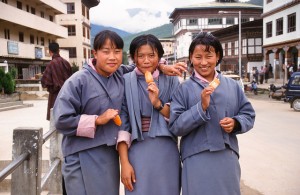Is the World Ready for Gross National Happiness?
Apr 9th, 2012 | By admin | Category: Economics and GDPBy Suzanne York, HowMany.org, April 9, 2012
Happiness is back in the news, at least at the United Nations. If you paid close attention, you were reminded that the UN unanimously adopted a resolution last year based on the concept of Gross National Happiness.
Officially called UN Resolution 65/309, “Happiness: towards a holistic approach to development”, it recognizes the pursuit of happiness as a fundamental human goal and that gross domestic product (GDP) does not adequately reflect happiness and well-being. The resolution also includes a point allowing Bhutan to convene a high-level meeting on the theme of happiness and well-being.
That meeting, called “Happiness and Well-being: Defining a New Economic Paradigm”, happened this past April 2nd and brought together some impressive people to talk about not only happiness, but also link it to GDP and our growth-at-all-costs economy and society.
If you’re asking “why Bhutan?” then you haven’t heard the story of that country’s introduction of an alternative model to GDP, started back in the 1970s. They call it Gross National Happiness (GNH) and believe it to be a better national indicator of progress because it is based on the principles of happiness and well-being.
Though one of the world’s poorest countries, Bhutan nevertheless is today ranked in the global top ten of happiest nations (according to Business Week). In contrast, the United States, with a far higher GDP, comes in at number 16; other rankings put the U.S. in 23rd place or even 114th.
Joining Bhutan’s prime minister Jigmi Thinley in calling for a new economic paradigm and new measures of well-being were Prince Charles, Jeffrey Sachs from Columbia University, Nobel laureate Joseph Stiglitz, and UN Secretary- General Ban Ki-moon. Ban told the audience that “Gross National Product … fails to take into account the social and environmental costs of so-called progress.”
The Secretary-General, perhaps keeping in mind the upcoming UN Conference on Sustainable Development, also known as Rio+20, said that “We need a new economic paradigm that recognizes the parity between the three pillars of sustainable development. Social, economic and environmental well-being are indivisible. Together they define gross global happiness.”
Prime Minister Thinley talked about the global economic meltdown and the unsustainable concept of limitless growth on a planet with finite resources. In the past, Bhutan’s leaders have said “The world is in need of an international consensus for the creation of a new economic paradigm with well-being indicators, new national accounting systems that count natural and social capital, and incentives for sustainable production.”
Coinciding with the “Happiness” meeting was the release of the World Happiness Report by economists Sachs, John Helliwell, and Richard Layard. to the authors, “U.S. GNP per capita has risen by a factor of three since 1960, while measures of average happiness have remained essentially unchanged over the half-century.” This increase in output has come at a high environmental cost, without a corresponding rise in the well-being of Americans.
The report says we can protect the planet and improve the quality of life “by adopting lifestyles and technologies that improve happiness (or life satisfaction) while reducing human damage to the environment.”
Many of the recommendations that come out of this meeting will be presented at the Rio+20 Earth Summit in June, which is focused on the themes of the green economy and sustainable development. Whether the ideas discussed on GNH and alternatives to GDP fall on deaf ears in Rio or not, it is obvious that the idea of rethinking our growth-based economies is gaining traction. Even French president Nicholas Sarkozy and UK prime minister David Cameron are conducting studies into alternative economic measurements and human well-being.
But it is little Bhutan that is inspiring people around the world to take a closer look at what really matters in life. Money and unsustainable economic growth do not equal happiness, nor does it make for a healthy planet. At Rio+20 and beyond, the words of Bhutanese King Jigme Khesar Namgyel should be a guiding light:
“There cannot be enduring peace, prosperity, equality and brotherhood in this world if our aims are so separate and divergent if we do not accept that in the end we are people, all alike, sharing the earth among ourselves and also with other sentient beings, all of whom have an equal role and stake in the state of this planet and its players.”
Suzanne York is a senior writer with the Institute for Population Studies/HowMany.org.

